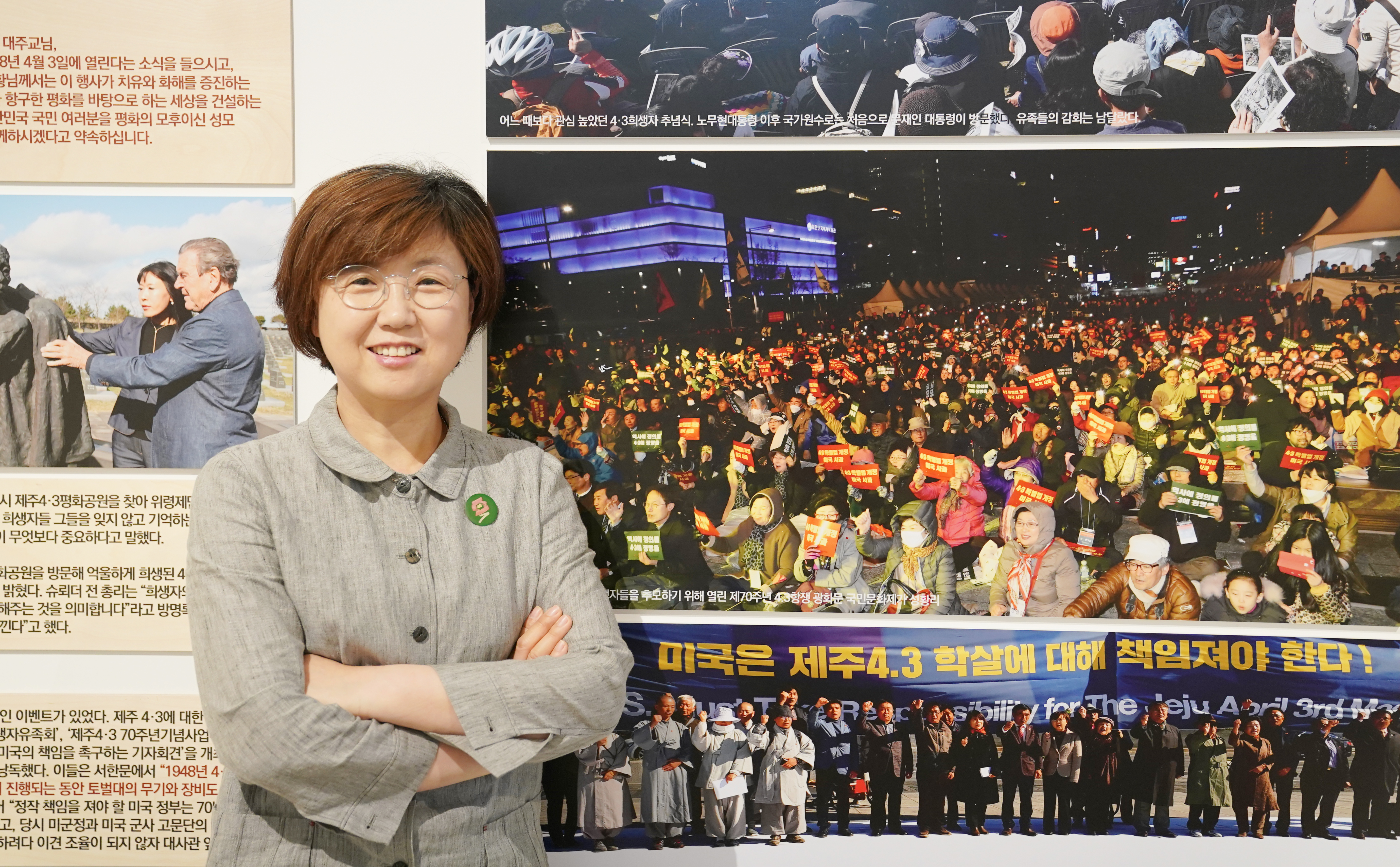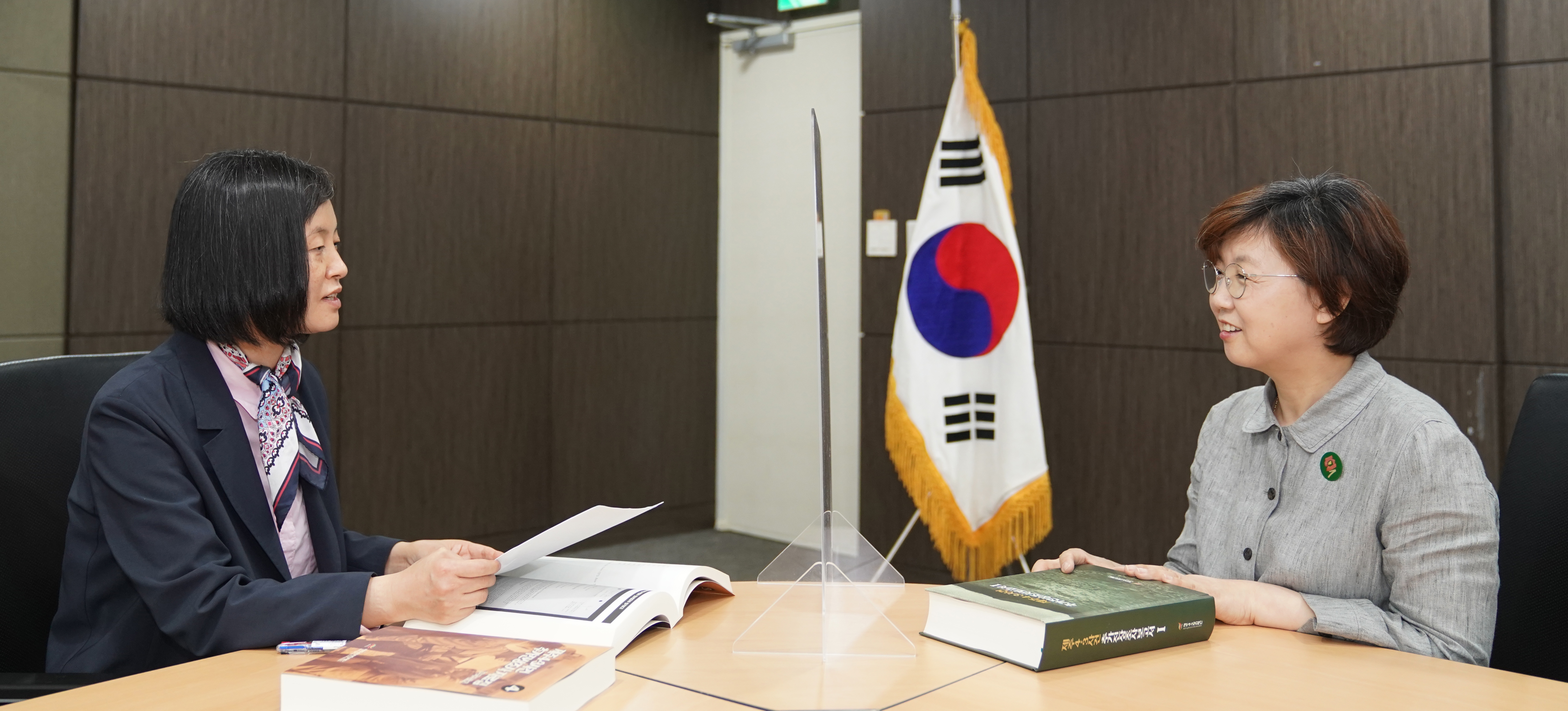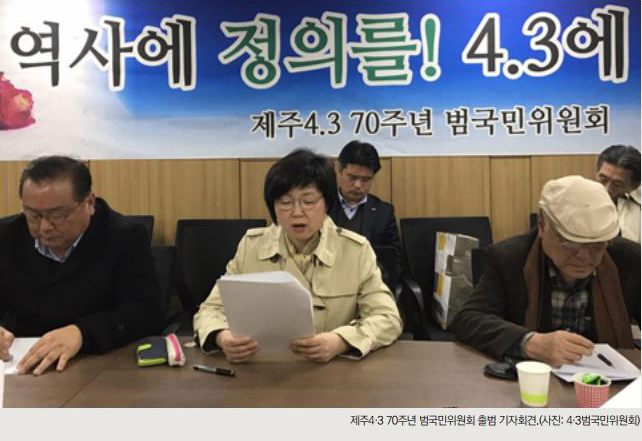Revision of Jeju 4·3 Special Act was My Last Mission as a Lawyer
Resolution of Jeju 4·3: Achievements and Contributions
Revision of Jeju 4·3 Special Act was My Last Mission as a Lawyer
Interview with Chung Yeon-soon, president of National Committee Commemorating the Jeju April 3rd Uprising and Massacre
Chung Yeon-soon, president of the Jeju 4·3 People’s Committee, was born in Seoul in 1967. Chung graduated from the Department of Public Law at Seoul National University and received her LL.M from Seoul National University Graduate School of Law and from Missouri State University in the United States. After passing the 1991 bar exam, she started her career as a practicing lawyer in 1994. In 2001, Chung worked as legal counsel for the Ministry of Government Administration and Home Affairs in response to the request for adjudication on a constitutional complaint regarding the Jeju 4·3 Special Act filed by conservative forces, leading to the dismissal of the constitutional complaint. She was elected the first woman president of MINBYUN in May 2016, making continued efforts to further the democratization and human rights movement. In 2017, Chung took office as a permanent co-representative of the Pan-National Committee on the 70th Anniversary of Jeju 4·3 and devoted herself to national-scale Jeju 4·3 commemoration projects. Since the committee was reorganized into the Jeju 4·3 People’s Committee, she has maintained a close relation with Jeju 4·3 as the committee’s president. Chung is a member of the Board of Directors of the Jeju 4·3 Peace Foundation and the representative managing partner of Kyong Law Group. Her other former titles include legal advisor to the Korea Sexual Violence Relief Center, member of the Deliberation Committee on the Registration of Japanese Military Comfort Women Victims at the Ministry of Gender Equality and Family, and head of the Headquarters for Correction of Discrimination at the National Human Rights Commission. — Editor
Interview and arrangement by Yang Jeong-shim, head of the Research and Investigation Office
Photography by Kim Yeong-mo, member of the Memorial Project Team
In 2016, you were selected as the first woman president of the Lawyers for a Democratic Society (MINBYUN). Please introduce us to MINBYUN.
I joined MINBYUN in 1994 when I started practicing as a lawyer. MINBYUN was founded in 1988 by lawyers who supported those who were victims of or resisted the dictatorship of South Korea. It had fewer than 100 members when I joined the group, but each of them have achieved epoch-making advancements in the history of Korean human rights advocacy. After 30 years, it has grown to some 1,200 members.
You were born and raised in Seoul. I wonder how you learned about Jeju 4·3.
When I was little, I didn’t have full knowledge of Jeju 4·3 because I had no relationship with Jeju and studied modern Korean history only roughly. It wasn’t until I became a college student that I read “Sun-I Samch’on” by Hyun Ki-young. As many other readers, I was completely shocked by the novel. It was like looking into a dark, deep well. It was so tragic that I at first even wanted to ignore it.
Soon after the Jeju 4·3 Act was enacted, the conservative forces continued to seek adjudication on a constitutional complaint. At that time, you spoke publicly for the government as a representative. What were the main issues?
As is well-known, the enactment of the Jeju 4·3 Special Act was not easy. Under those circumstances, several lawsuits were filed accusing the law of being unconstitutional. In particular, there was a lawsuit that claimed Article 2 Section 2 of the Jeju 4·3 Special Act included armed guerrillas as victims. At that time, I was serving as a legal advisor to the Ministry of Government Administration and Home Affairs and participated in the lawsuit as a representative for the government.
This was a bit of a professional legal issue. In order to be judged that a statute has violated a person’s fundamental rights, it must have such consequences of itself. However, the Jeju 4·3 Special Act only stipulated that victims should be individually determined according to the investigation of the Committee on Discovering the Truth on the Jeju 4·3 Incident and Restoration of Honor of Victims (Jeju 4·3 Committee). Therefore, such an argument is difficult to accept. The Constitutional Court decided to dismiss the case, which means that the case fails to meet the requirement for a request for adjudication on a constitutional complaint before a full-scale examination can be launched. In other words, the direct infringement of the fundamental rights was not recognized by law.

Chung Yeon-soon visits Jeju 4·3 Archive Exhibition “Traces that became a document” held by the Jeju 4·3 Peace Foundation. Chung stands beside the Corner for the Pan-National Committee for the 70th Anniversary of Jeju 4·3 and the People’s Cultural Festival held at Gwanghwamun.
What was your argument at the time?
As I was neither the claimant nor the respondent’s representative but a representative of the relevant government authority, I thought I would only need to submit a written opinion. However, I was notified that I was to speak publicly in advocacy of the government. These days, the Constitutional Court holds quite a few public hearings, but it was a bit of an exception at that time. It was my first experience to appear before the Constitutional Court in person. Although young lawyers nowadays take extra care regarding public hearings by preparing PowerPoint and video materials, it wasn’t what I had been used to back then. I would have spoken more nicely and at more length now (laughs), but I just made a brief argument. I recall that I said, “does not meet the requirements for filing a constitutional complaint” and “this law means we should, through a thorough investigation of the truth, not repeat the tragedy of our history—not that we take sides with one ideology.” As expected, the Constitutional Court decided to dismiss the case. That was how I became a member of the Deliberation Subcommittee on Medical Support for Survivors under the Jeju 4·3 Committee.

Chung Yeon-soon (right) and Yang Jung-shim meet for an interview on the revision of Jeju 4·3 Special Act and projects for publicizing the case at the national level.
On the 70th anniversary of Jeju 4·3, you deepened your relationship with the issue and even served as a permanent co-representative of the Pan-National Committee for the 70th Anniversary of Jeju 4·3. Could you share anything memorable to you?
After working for the Subcommittee on Medical Support for Survivors, I didn’t think there would be any more relationship with Jeju 4·3. But after taking office as the chairman of MINBYUN, there was a proposal that it would be good for MINBYUN to take one of the five standing co-representative positions of the Pan-National Committee for the 70th Anniversary of Jeju 4·3. Although I didn’t do much individually, I kept pace with the plan of the executive headquarters and could hold commemorative events marking the 70th anniversary of Jeju 4·3.
The most memorable event to me was the People’s Cultural Festival held at Gwanghwamun Square on April 7, 2018. It was an event to remember Jeju 4·3 and share the memories with citizens at Gwanghwamun Square in the heart of Seoul. We set up more than 60 promotional booths run by different institutions and organizations, including the Association of the Bereaved Families of Jeju 4·3 Victims, the Jeju 4·3 Peace Foundation, the Jeju 4·3 Research Institute, the Jeju Women’s Self-Support Promotion Center, the Jeju branch of the Association of Writers for National Literature, The Jeju People’s Art Federation, the Commemorative Project Committee for the 70th Anniversary of Jeju 4·3, and Jeju Dark Tours. The event attracted attention from young citizens, with the participation of students from 13 middle schools in the Gangseo-gu and Yangcheon-gu regions. Not only the Seoul Association of the Bereaved Families of Jeju 4·3 Victims consisting of Jeju residents living on the Korean mainland, but other groups that share the historic wounds of Jeju 4·3 joined the event at the square.
To my knowledge, some 30,000 people visited the festival. The 4370 newspaper prepared by the Pan-National Committee and the booklet “What is 4·3?” ran out. The weather was really cold, but the interest of those who visited the square was so great that I was really proud.

The Pan-National Committee for the 70th Anniversary of Jeju 4·3 holds a launching press conference. (Image: Pan-National Committee for the 70th Anniversary of Jeju 4·3)
On Feb. 26, 2021, the general revision of the Jeju 4·3 Special Act was passed at the National Assembly. As a lawyer, you have shown a keen interest in the issue for a long time. How do you feel about the revision and what provisions are particularly noteworthy?
There are various things, but above all, the revision now made it possible to request the ex officio re-opening of the en bloc retrial procedures for collective cases concerning those convicted by unlawful courts-martial. Eliminating the need for repeating useless litigation procedures is the real reward of this legislative movement. To add a comment about the latest revision itself, we often think of the past as a resolved issue, saying “the special law has already been made” or “it has already been compensated and indemnified by law.” However, we must continue to look back on the past from the present point of view and continue to reflect on its current meaning.
Particularly, the heartbreaking and sorrowful history of those victimized by state power can be repeated at any time — now or in the future — so we must continue to look back and correct previous wrongs. The latest revision proves that Korean society has continuously worked to correct itself while contemplating the principles of resolving past wrongdoings in its modern history, without just satisfying itself with having enacted a half-complete law 20 years ago. It really resonated with me because it was something that could be set as a model for the world. I’d like to express my gratitude to everyone who has contributed to the revision.
The Pan-National Committee for the 70th Anniversary of Jeju 4·3 finished the 70th anniversary commemorative projects. It is now reorganized into the Jeju 4·3 People’s Committee, working to publicize the Jeju 4·3 issues at the national level. What kinds of activities is your committee currently pursuing?
After the 70th anniversary, there was a sense of inadequacy because we failed to achieve the revision of the Jeju 4·3 Special Act, which was our original goal. It was also necessary to steadily carry out nationwide projects to publicize Jeju 4·3. Therefore, those who led the project in the field decided to launch the Jeju 4·3 People’s Committee as an incorporated association. Above all, I am happy that the Jeju 4·3 Special Act was finally revised, though belatedly. Other than that, we have been carrying out such projects as exhibitions, lectures, and education programs on a national scale. Unfortunately, however, the projects could not be expanded as the COVID-19 pandemic has lasted for more than a year. In commemoration of the 73rd anniversary, we held the exhibition titled, “Spring is coming,” at the Gyeonggi Art Center to promote Jeju 4·3 to Gyeonggi-do residents.
Let’s move on to a topic that is a little lighter. Your husband, lawyer Baek Seunghun, also served as MINBYUN chairman. How did you two meet? I wonder what the human rights sensibility of your marriage is like (laughs).
He was a member of MINBYUN who joined the group before me. Both of us are lawyers, so the advantage is that there is no need for a long discussion. As with any couple, our marriage cannot be said to be free from human flaws or shortcomings. There are many things we lack in the principles of equality, consideration, and respect, but I think it is important to show our efforts throughout life.
Lastly, please tell us about the future direction and activities of yourself and the Jeju 4·3 People’s Committee.
Many people still think of Jeju Island just as a place with beautiful scenery. Education, culture, and academic projects about the tragedy and historical significance of Jeju 4·3 need to be carried out on a national scale. Nevertheless, I often hear people say, “How is Jeju 4·3 different from other cases?” and, “Isn’t it all resolved because the revision of the special law has been completed?” They think that Jeju 4·3 is a matter confined only to those involved in the case. However, resolving, recording, and teaching the past wrongdoings as part of modern Korean history is everyone’s job and the project needs to be continued. I hope that the Jeju 4·3 People’s Committee will have people working with the mindset of planting a tree for 10 or 20 years.
Thinking about others in their position, or the spirit of solidarity, is not a matter of law in the form of compulsory norms. I have been involved in a lot of matters because I am a lawyer, rather than staging a grandiose human rights movement. I worked for the revision of the Jeju 4·3 Special Act with the thought that perhaps it would be my last mission a lawyer. There are many juniors who outperform me, so I expect that they will do the rest of the work well.